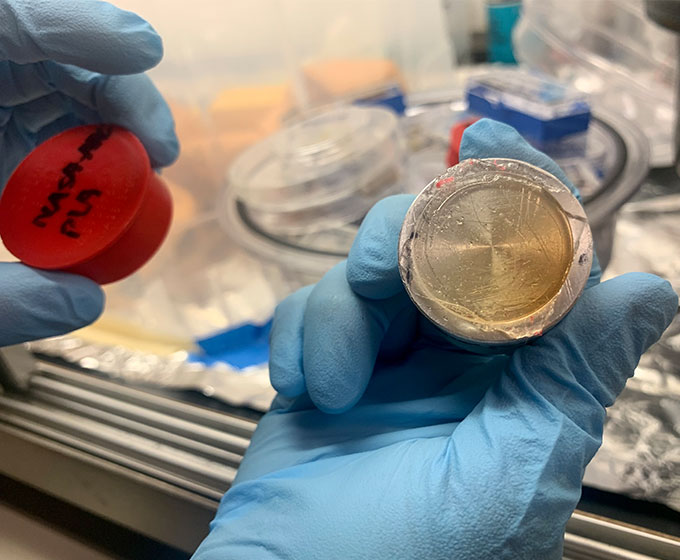
A sample dish in Xinting Yu's lab containing a quarter-sized, orange haze mimicking the atmosphere of Titan, a moon orbiting Saturn.
JUNE 15, 2023 — Xinting Yu sorts though the mound of samples in her lab for a dish containing a quarter-sized, orange haze mimicking the atmosphere of Titan, a moon orbiting Saturn. She needs it to measure the range of Titan’s surface properties for its cohesion, adhesion and electrical charge.
An assistant professor in the UTSA Department of Physics and Astronomy, Yu is among five scientists selected by NASA to receive the Planetary Science Early Career Award. The award aims to advance research of early-career scientists with up to $200,000 over five years, positioning them to serve in an increasingly meaningful role in the planetary science community.
Yu’s research focuses on various atmospheric and surface processes of Titan. She plans to use the funds to establish a Planetary Material Characterization Facility at the UTSA Main Campus.
“The facility will obtain and analyze the properties of various planetary materials, including aerosol analogs, meteorites, field samples, regolith simulants and returned samples,” Yu said. “The experimental data will be stored in easily accessible, community-friendly databases, which will be used for theoretical modeling to better understand atmospheric and surface processes within and beyond our solar system.”
Yu is especially excited about the opportunities in planetary research the new facility will provide for UTSA undergraduates. She also hopes the facility, based in the College of Sciences, will further UTSA’s contributions in space research.
Her research team will create an authentic database cataloging planetary and exoplanetary properties to enhance scientists’ understanding of planetary atmospheres and surfaces.
“Our research is crucial in paving the way for the future of planetary science. By developing the Planetary Material Characterization Facility at UTSA and providing a platform for comprehensive material data analysis, we are enabling new avenues for planetary and exoplanet experimental research,” Yu said. “Our focus is on broadening participation and fostering a diverse, next-generation workforce for the field.”
Part of Yu’s award will be used to organize a Texas Area Planetary Science meeting series, fostering a community of local planetary scientists and collaboration among students and institutions. The first meeting series will be held in August at the UTSA School of Data Science.
Yu earned her Ph.D. in Planetary Science at Johns Hopkins University in 2019 and completed a post-doctoral fellowship at the University of California, Santa Cruz from 2019 to 2022.
UTSA Today is produced by University Communications and Marketing, the official news source of The University of Texas at San Antonio. Send your feedback to news@utsa.edu. Keep up-to-date on UTSA news by visiting UTSA Today. Connect with UTSA online at Facebook, Twitter, Youtube and Instagram.
Late Night at the Rec is an awesome UTSA tradition that turns a typical information session into an exciting night of fun. It's a unique opportunity to meet new people and reconnect with old friends.
Campus RecreationCheer on the UTSA Soccer team as they take on Lamar in the first home game of the season.
Park West FieldShow your UTSA pride with our spirited crew—Rowdy, Cheer, the Spirits of the Roadrunner, and the incredible Spirit of San Antonio Marching Band (SOSA)—as we light up the night in true Roadrunner style.
Main Campus East Lawn, Main CampusAnnual Giving will host a First Day of School celebration to welcome students back to campus. We will have giveaways and photo opportunities.
Sombrilla Plaza, Main CampusEnjoy snacks while connecting with Adobe reps and student ambassadors. Download or log into the Adobe Express app to snag swag and unlock exclusive back-to-school templates. It’s a fun, fast way to get creative and start the school year with bold moves.
Central Plaza, Main CampusCelebrate the merger of UTSA and UT Health San Antonio with a pop-up featuring free t-shirts, exclusive swag, and interactive photo opportunities. Open to all students, faculty and staff. Supplies are limited!
Sombrilla Plaza, Main CampusHuddle Against Hunger is a fundraising competition with Texas State that benefits our Roadrunner Pantry. Donations this week will help UTSA earn additional prize monies provided by RBFCU.
In-Person and VirtualThe University of Texas at San Antonio is dedicated to the advancement of knowledge through research and discovery, teaching and learning, community engagement and public service. As an institution of access and excellence, UTSA embraces multicultural traditions and serves as a center for intellectual and creative resources as well as a catalyst for socioeconomic development and the commercialization of intellectual property - for Texas, the nation and the world.
To be a premier public research university, providing access to educational excellence and preparing citizen leaders for the global environment.
We encourage an environment of dialogue and discovery, where integrity, excellence, respect, collaboration and innovation are fostered.